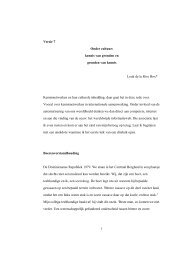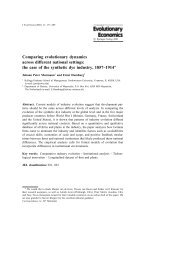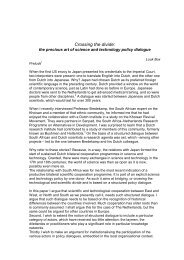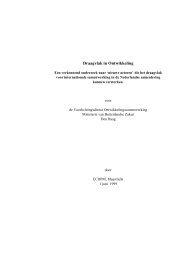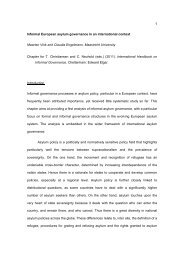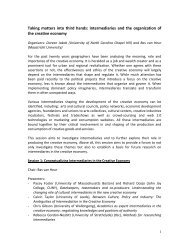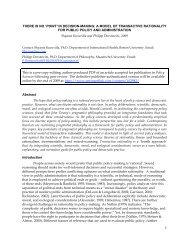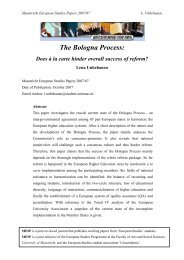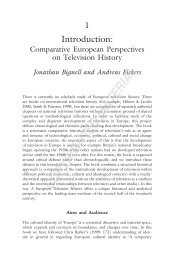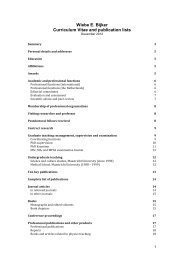Winds of Change: The Europeanization of National Foreign Policy
Winds of Change: The Europeanization of National Foreign Policy
Winds of Change: The Europeanization of National Foreign Policy
You also want an ePaper? Increase the reach of your titles
YUMPU automatically turns print PDFs into web optimized ePapers that Google loves.
Maastricht European Studies Papers 2007/01 Bennet Strang<br />
(Torreblanca, 2001; Featherstone, 2003; Smith, 2004; Mahncke, 2004). <strong>The</strong> COREU telex<br />
system 58 , firstly, embodies this réflexe communautaire (Wong, 2005) and, secondly, serves as<br />
an enabling feature for coordination to take place. One might suggest that the very existence<br />
<strong>of</strong> this réflexe is indicative <strong>of</strong> a feedback process, characterized by “…national<br />
politicians…increasingly think[ing] in European terms…” (Mahncke, 2004, p. 372).<br />
4.2.4 Bureaucratic Re-organization<br />
This ‘thinking in European terms’ is also reflected in the extensive re-organization <strong>of</strong> national<br />
foreign service structures in response to improving participation in CFSP over the years 59<br />
(Sjursen, 2003). New national CFSP counsellors have been appointed, diplomatic services<br />
extended and departmental re-orientation towards Europe has taken place. In this process,<br />
smaller member states have been more willingly adjusted their comparatively limited<br />
administrative structures (Smith, 2000). It might be suggested that as the European venue is<br />
pivotal for smaller states in contrast to larger ones, which have more alternative diplomatic<br />
channels, the former ones have to concentrate all their efforts on the European venue to make<br />
their impact felt. Furthermore, whereas the UK, for instance, might consider the use <strong>of</strong><br />
European channels to be a loss compared to its lost world power status, smaller states more<br />
likely regard this venue to be a gain for the conduct <strong>of</strong> their foreign policy and status upgrade.<br />
4.3 Enabling and (Constraining) Conceptual Limits<br />
After having elaborated on the theoretical components <strong>of</strong> the concept, the focus will shift to<br />
the debate as to whether <strong>Europeanization</strong> enables and/ or constrains national governments in<br />
their conduct <strong>of</strong> foreign policy. This will be followed by an outline <strong>of</strong> the concept’s limits.<br />
Turning to the enabling theory first, functional logic holds that the European venue can be<br />
not convergence” (Radaelli, 2004, p. 14; Radaelli, 2000). <strong>The</strong> member states are still in the driver’s<br />
seat when it comes to deciding on whether they converge on positions and act collectively or not<br />
(Smith, 2003). For the time being, the ‘cooperators’ prevail over the ‘integrators’, as “[c]oordination<br />
rather than integration…remains the guideline” (Mahncke, 2004, p. 32; Hill, 1983; Smith, 2003).<br />
58 This system, which enables European national foreign ministries to exchange information in a very<br />
short time and, eventually, coordinate action, is “…assumed to have a socializing character and to<br />
support the convergence among national foreign policy actors” (Osswald, 2005, p. 21). Accordingly,<br />
“Spanish participation in the EPC framework…proved decisive to socialize Spanish diplomats in the<br />
habits <strong>of</strong> coordination and consensus-seeking and to have Spanish policies gradually converge with<br />
those <strong>of</strong> the other member states” (Torreblanca, 2001).<br />
59 Thus, “there is substantial evidence to show that EU membership in general and CFSP membership<br />
in particular influence the way individual member states organize their pursuit <strong>of</strong> foreign policy”<br />
(Smith, 2000, p. 619; Smith, 2004).<br />
16



